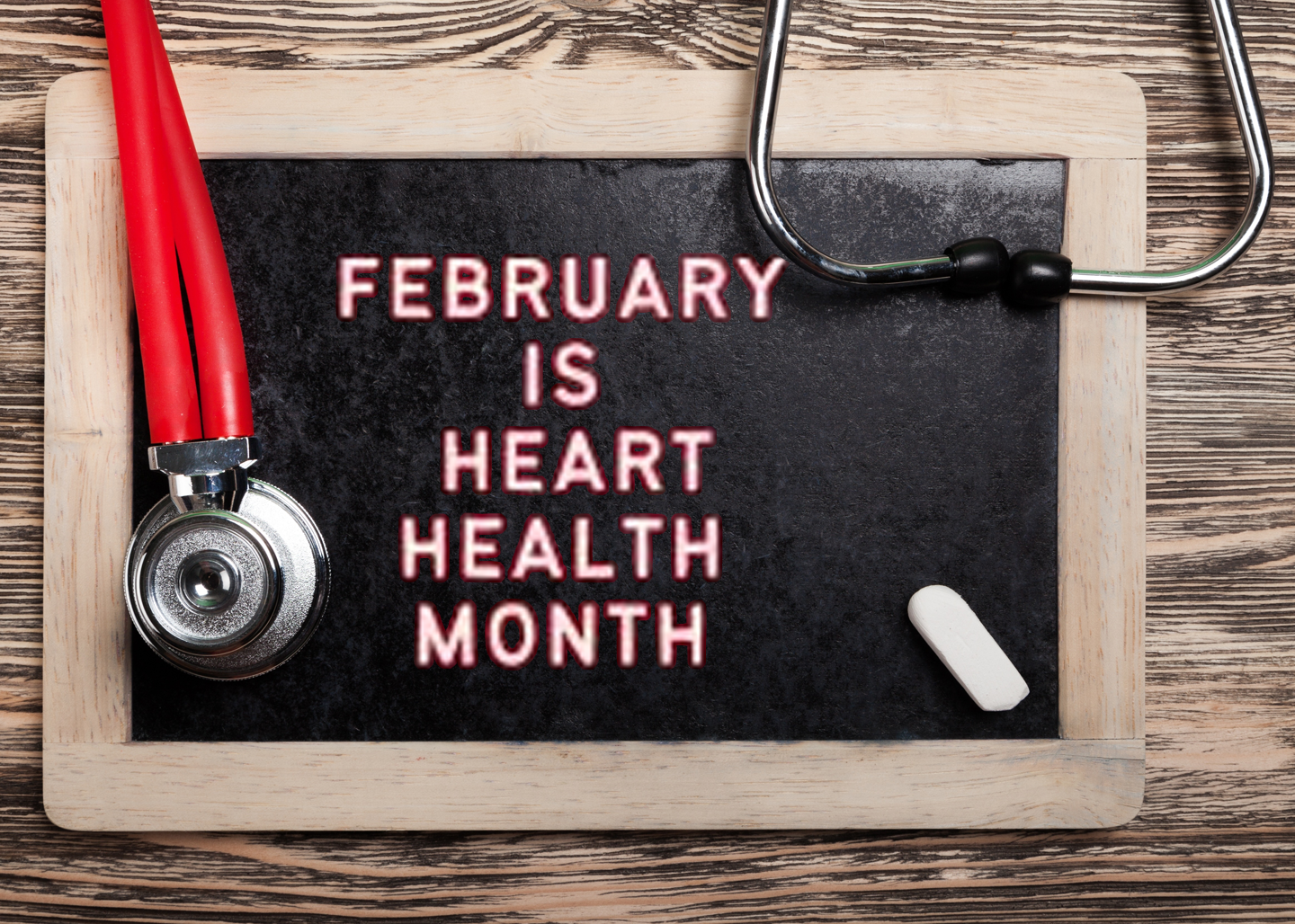February Agency Insights
American Heart Month: Loving Your Heart Inside Out

Why is February heart health month?
President Lyndon B. Johnson, among the millions of people in the country who’d had heart attacks, issued the first proclamation in 1964. Since then, U.S. presidents have annually declared February American Heart Month.
Understanding and managing stress is crucial for maintaining heart health. Chronic stress can contribute to the development of heart-related issues, so it’s essential to adopt effective stress management strategies. Below is a guide on the link between stress and heart health, along with tips for stress management.
Health Guides
Understanding the Link Between Stress and Heart Health
- Fight or Flight Response:
- When you experience stress, your body activates the “fight or flight” response, releasing hormones like cortisol and adrenaline.
- This physiological response can lead to increased heart rate, elevated blood pressure, and changes in blood flow.
- Chronic Stress and Inflammation:
- Prolonged stress can contribute to chronic inflammation, which is associated with the development of atherosclerosis (hardening of the arteries) and other heart-related issues.
- Unhealthy Coping Mechanisms:
- Individuals under stress may resort to unhealthy coping mechanisms, such as smoking, overeating, or excessive alcohol consumption, which can negatively impact heart health.
- Sleep Disruption:
- Chronic stress can interfere with sleep patterns, and inadequate sleep is linked to an increased risk of heart disease.

Tips for Managing Stress and Promoting Heart Health
- Regular Exercise:
- Engage in regular physical activity, such as walking, jogging, or yoga, to help reduce stress and improve overall cardiovascular health.
- Deep Breathing Exercises:
- Practice deep breathing exercises to activate the body’s relaxation response. Inhale deeply through your nose, hold for a few seconds, and exhale slowly through your mouth.
- Mindfulness Meditation:
- Incorporate mindfulness meditation into your routine to cultivate a present-focused and calm state of mind.
- Establish Healthy Sleep Habits:
- Prioritize quality sleep by maintaining a consistent sleep schedule, creating a relaxing bedtime routine, and ensuring a comfortable sleep environment.
- Healthy Nutrition:
- Adopt a heart-healthy diet rich in fruits, vegetables, whole grains, lean proteins, and omega-3 fatty acids. Avoid excessive caffeine and limit processed foods.
- Social Connections:
- Foster positive social connections and spend time with loved ones. Social support can provide a buffer against stress.
- Time Management:
- Organize your time effectively, prioritize tasks, and set realistic goals to reduce the feeling of being overwhelmed.
- Hobbies and Leisure Activities:
- Engage in activities you enjoy, whether it’s reading, gardening, or pursuing a hobby. Taking time for leisure is essential for stress reduction.
- Professional Support:
- If stress becomes overwhelming, consider seeking support from a mental health professional. Therapy and counseling can provide effective strategies for coping with stress.
- Limit Stimulants:
- Reduce the intake of stimulants, such as caffeine and nicotine, which can contribute to increased stress levels.
By incorporating these stress management techniques into your daily life, you can help protect your heart health and contribute to overall well-being. Remember that small, consistent changes can make a significant impact over time.
Heart-Healthy Recipes
Mediterranean Chickpea Salad
Here’s a heart-healthy recipe that is nutrient-rich and promotes cardiovascular health. Consider nutrient-rich recipes that promote cardiovascular health are always a great idea!
Ingredients:
- 2 cans (15 oz each) chickpeas, drained and rinsed
- 1 cucumber, diced
- 1 cup cherry tomatoes, halved
- 1/2 cup red onion, finely chopped
- 1/2 cup Kalamata olives, pitted and sliced
- 1/2 cup crumbled feta cheese (optional)
- 1/4 cup fresh parsley, chopped
For the Dressing:
- 3 tablespoons extra-virgin olive oil
- 2 tablespoons red wine vinegar
- 1 clove garlic, minced
- 1 teaspoon dried oregano
- Salt and pepper to taste
Instructions:
- In a large bowl, combine chickpeas, cucumber, cherry tomatoes, red onion, Kalamata olives, and feta cheese (if using).
- In a small bowl, whisk together olive oil, red wine vinegar, minced garlic, dried oregano, salt, and pepper to create the dressing.
- Pour the dressing over the salad and toss gently to coat all the ingredients.
- Let the salad marinate in the refrigerator for at least 30 minutes to allow the flavors to meld.
- Before serving, sprinkle fresh parsley over the top for added freshness.

Serve the Mediterranean Chickpea Salad on its own or as a light meal or by adding grilled salmon or chicken. Enjoy!
The Benefits of Regular Checkups
1. Prevention and Early Intervention: Regular screenings help identify health issues early, allowing for prompt intervention and preventive measures.
2. Management of Chronic Conditions: For those with chronic conditions, regular check-ups aid in managing and adjusting treatment plans as needed.
3. Promotion of Healthy Lifestyle: Healthcare providers can offer guidance on maintaining a healthy lifestyle, including nutrition, exercise, and stress management.
4. Establishing a Health Baseline: Regular check-ups provide a baseline for your health status, aiding in the tracking of changes over time.
The Importance of Regular Check-ups
Highlighting the significance of regular health check-ups, including blood pressure and cholesterol screenings.
Regular health check-ups, including essential screenings for blood pressure and cholesterol, play a crucial role in maintaining overall well-being and preventing potential health issues. Here’s an overview of the importance of these check-ups:
Blood Pressure Screenings:
• Silent Hypertension: High blood pressure (hypertension) is often referred to as the “silent killer” because it may not cause noticeable symptoms but can lead to serious health conditions like heart disease, stroke, and kidney damage.
• Early Detection: Regular blood pressure screenings help detect hypertension early, allowing for timely intervention and lifestyle modifications.
How Often:
• Blood pressure should be checked at least once a year for most adults.
• More frequent monitoring may be necessary for individuals with a history of high blood pressure, heart disease, or other risk factors.
Cholesterol Screenings:
• Heart Disease Risk: High levels of LDL cholesterol (bad cholesterol) and low levels of HDL cholesterol (good cholesterol) are associated with an increased risk of heart disease.
• Preventive Action: Regular cholesterol screenings enable healthcare providers to assess cardiovascular risk and recommend lifestyle changes or medications as needed.
How Often:
• Adults should have their cholesterol levels checked at least once every five years.
• More frequent screenings may be recommended for individuals with risk factors such as family history of heart disease, diabetes, or obesity.
Overall Health Check-ups:
• Early Detection of Conditions: Regular health check-ups include a comprehensive assessment of your overall health, helping identify potential health issues before they become more serious.
• Preventive Care: Check-ups provide an opportunity for preventive care, including vaccinations, cancer screenings. Also, preventative health is covered 100% by your plan!
How Often:
• Adults should have a general health check-up at least once a year.
• Depending on age, gender, and individual health risks, more frequent check-ups or specific screenings may be recommended.

